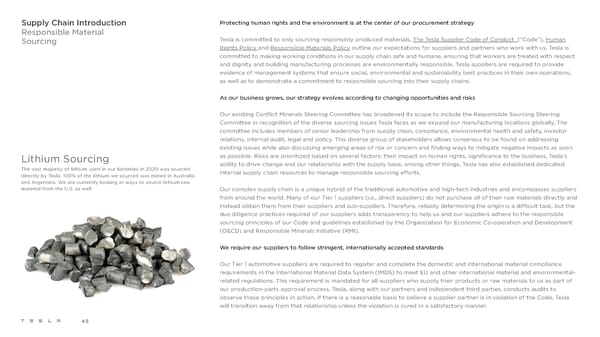Supply Chain Introduction Protecting human rights and the environment is at the center of our procurement strategy Responsible Material Sourcing Tesla is committed to only sourcing responsibly produced materials. The Tesla Supplier Code of Conduct (“Code”), Human Rights Policy and Responsible Materials Policy outline our expectations for suppliers and partners who work with us. Tesla is committed to making working conditions in our supply chain safe and humane, ensuring that workers are treated with respect and dignity and building manufacturing processes are environmentally responsible. Tesla suppliers are required to provide evidence of management systems that ensure social, environmental and sustainability best practices in their own operations, as well as to demonstrate a commitment to responsible sourcing into their supply chains. As our business grows, our strategy evolves according to changing opportunities and risks Our existing Conflict Minerals Steering Committee has broadened its scope to include the Responsible Sourcing Steering Committee in recognition of the diverse sourcing issues Tesla faces as we expand our manufacturing locations globally. The committee includes members of senior leadership from supply chain, compliance, environmental health and safety, investor relations, internal audit, legal and policy. This diverse group of stakeholders allows consensus to be found on addressing existing issues while also discussing emerging areas of risk or concern and finding ways to mitigate negative impacts as soon Lithium Sourcing as possible. Risks are prioritized based on several factors: their impact on human rights, significance to the business, Tesla’s ability to drive change and our relationship with the supply base, among other things. Tesla has also established dedicated The vast majority of lithium used in our batteries in 2020 was sourced internal supply chain resources to manage responsible sourcing efforts. directly by Tesla. 100% of the lithium we sourced was mined in Australia and Argentina. We are currently looking at ways to source lithium raw material from the U.S. as well. Our complex supply chain is a unique hybrid of the traditional automotive and high-tech industries and encompasses suppliers from around the world. Many of our Tier 1 suppliers (i.e., direct suppliers) do not purchase all of their raw materials directly and instead obtain them from their suppliers and sub-suppliers. Therefore, reliably determining the origin is a difficult task, but the due diligence practices required of our suppliers adds transparency to help us and our suppliers adhere to the responsible sourcing principles of our Code and guidelines established by the Organization for Economic Co-operation and Development (OECD) and Responsible Minerals Initiative (RMI). We require our suppliers to follow stringent, internationally accepted standards Our Tier 1 automotive suppliers are required to register and complete the domestic and international material compliance requirements in the International Material Data System (IMDS) to meet EU and other international material and environmental- related regulations. This requirement is mandated for all suppliers who supply their products or raw materials to us as part of our production-parts approval process. Tesla, along with our partners and independent third parties, conducts audits to observe these principles in action. If there is a reasonable basis to believe a supplier partner is in violation of the Code, Tesla will transition away from that relationship unless the violation is cured in a satisfactory manner. 45
 Tesla Impact Report 2020 Page 44 Page 46
Tesla Impact Report 2020 Page 44 Page 46